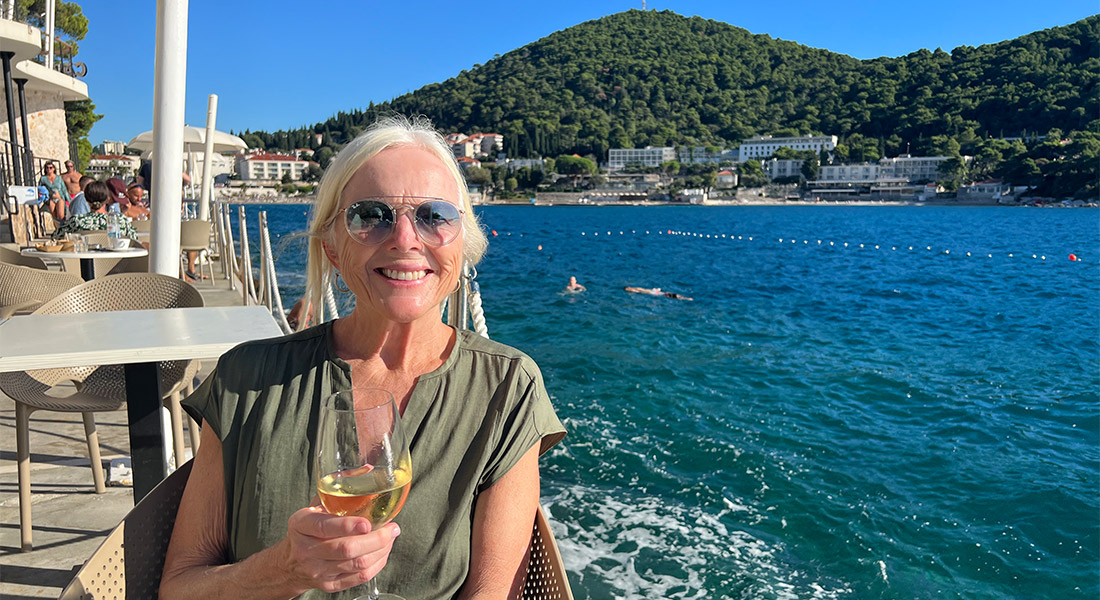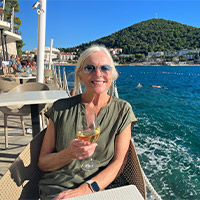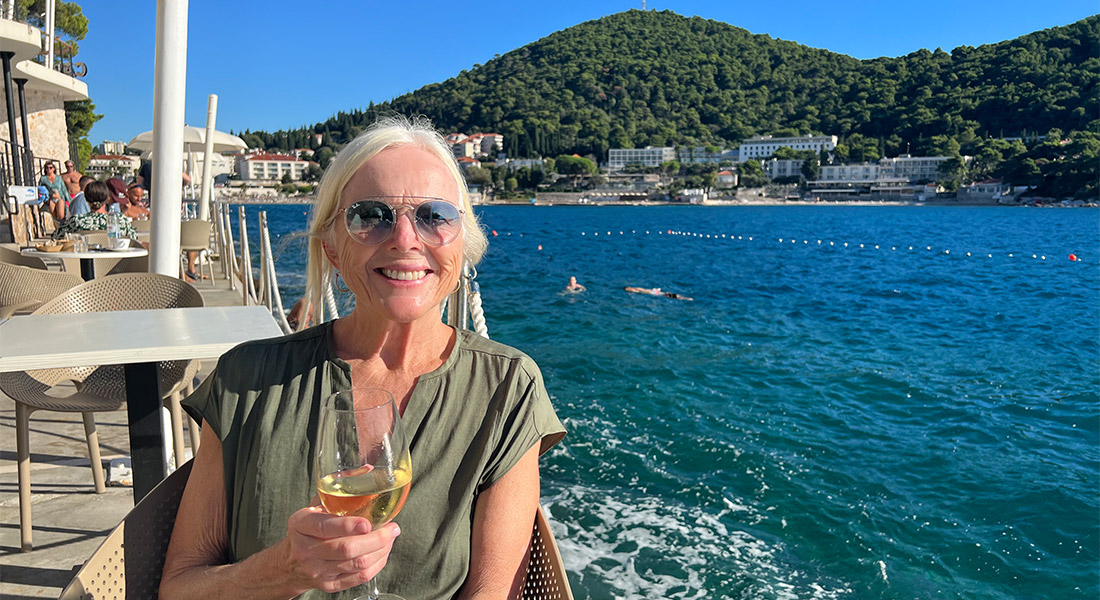
Things to do in Croatia: From Dubrovnik to Zagreb

October 22, 2024
12 minute read
What to Do with Six Days in Croatia
Our 15-day “Taste of the Balkans” tour* began and ended in Croatia, with destinations in Bosnia and Herzegovina, Slovenia, and Montenegro (also former regions of Yugoslavia) also woven into this great Dubrovnik to Zagreb itinerary. But our time in Croatia is where we’ll begin sharing our trip highlights with you. Here’s a sampling of what we loved about Croatia.
3 Things to Do in Dubrovnik, Croatia

Perhaps the most well-known of the Croatian cities is Dubrovnik on the Adriatic coast where our Collette explorations tour began. After a very informative included walking tour of Old Town and its historic landmarks, we took off on our own and packed the day full of activities, but these were our three favourite experiences and recommendations for things to do in Dubrovnik, Croatia.
1. Walking the city walls of Dubrovnik

There are parts of the walk that can be challenging for people with mobility or health issues as there is considerable uphill climbing and uneven stone steps — however, the views of the sea and old city below are absolutely amazing. The full circuit takes one to two hours to complete, and whilst the whole route offers spectacular 360 views, there are places to exit about halfway through should you need to.

2. Riding the Cable Car Up Mount Srd
When in Dubrovnik, don’t miss a chance to take the cable car to the top of Mount Srd. The ride is fun, the views are stunning, and you can enjoy lunch or a drink in the restaurant, too. You can also see a portion of the city walls from above in the photo below.

3. Finding “Game of Thrones” filming locations

As a Game of Thrones fan, Mr. TWS was thrilled to find the filming locations in Dubrovnik such as the city walls, Fort Minčeta, Lokrum Island, and the Jesuit Steps. I did the “walk of shame” on the Jesuit Steps — but since I kept my clothes on it was a version rated appropriate for all audiences. You can see the video in our Instagram gallery.
Things to See in Croatia’s Istria Region
As we drove into the Istria region in northwestern Croatia, it was easy to picture it as part of Italy — which it actually was until 1947. You’ll find landscapes, cuisine, and traditions reminiscent of Venice in the coastal towns and of Tuscany in the rolling hills and hilltop villages further inland.
Explore Rovinj - “Venetian Croatia”
We thought of our visits to Venice when we entered Rovinj, the cultural centre of Istria. Not only because of the setting on the water and Venetian-style architecture, but we could also hear snippets of Italian being spoken as we strolled along the waterfront. Shops, restaurants, and galleries line some of the stairways and alleys leading to the top of the city where the cathedral stands.

Mr. TWS and I felt that Rovinj had a strong feeling of romance and on this beautiful sunny day we had a nice romantic light lunch at a restaurant along one of the cobblestone streets.

If you look down some of the narrow lanes as you pass, you’ll find areas that are quieter and seem more residential with flower pots on windowsills, laundry hanging on lines above, and bicycles leaning against doorways.

Inland Istria - “Tuscan Croatia”
We felt like we were transported to Tuscany surrounded by vineyards and olive groves on the rolling hills when we travelled to inland Istria. Signature features of this part of Croatia are the picturesque hilltop towns crowned with medieval city walls and towers, with homes lining the roads winding down the hillsides.

Explore Motovun
Motovun, the highest hilltop town in Istria, was our home for three nights at Roxanich Winery and Design Hotel. It was a great base for our tour activities, including our visit to Rovinj, truffle hunting, and olive oil tasting.

In our free time, we also went to the hilltop to walk the medieval city walls and enjoy the panoramic views. There is a shuttle bus that runs up and down the hill. We chose to ride it up, but enjoyed the walk down.




Go Truffle Hunting
At Prodan Tartufi we spent a delightful morning with the owners of this family run business and two of their truffle-hunting dogs in the woods on the family’s property in Buzet. We followed along as the dogs sniffed their way through the woods until a black truffle treasure was found. Delicious brunch dishes like scrambled eggs with truffle shavings on top were prepared and served to us in the beautiful hilltop setting, topping off a perfect experience.

Olive Oil Tasting
Olive oil production is important to the people of Istria. The mostly small family-run operations produce what is considered some of the best oils in the world. The area’s particular climate extremes — hot and dry seasons, cool nights, and the wind are reasons for the high quality of the olives and olive oil. Our visit to Oleum Vitae in Krasica included instruction on how to best sample the oil to fully appreciate the quality and freshness. We tasted two oils, one which had just been pressed the night before.

People and Traditions of Croatia
At our hotel in Licko Petrovo Selo, Hotel Lyra near Plitvice Lakes, we were introduced to Sonja Leka of the Tara Association. The association was founded after the 1990s war when refugees returned to the area. Sonja told us about those difficult times and the work of the association which provides purpose and income for the women. Mostly older ladies, they knit various woollen items like gloves, socks, and hats; and make jams and other traditional food products. Some in the Tara community are also employed by the hotel.

You might be surprised to learn that the most popular of their woollen items is the nakurnjak (codpiece). Although now a fun and unusual souvenir for tourists, the “willie warmer” was very practical when there was little protection from the elements for sensitive parts before the introduction of modern men’s underwear.
Natural Beauty of Croatia- Plitvice Lakes National Park

Plitvice Lakes is the most well-known of Croatia’s national parks and is designated as a UNESCO World Heritage Site. We were delighted that Sonja Leka was our guide here.
“50 shades of green” is one way that Sonja described this gorgeous national park during our three-hour walk. Peace and tranquility can be found in the lush forests and among the 16 clear emerald-hued lakes. Step by step we walked the paths of the park in awe of every sight. We walked on the wooden plank paths high up on the cliffs and down below alongside the clear lakes among the forest’s wildflowers.

We were told that the park’s beautiful waterfalls were not as voluminous this year because of drier than normal seasons, but they captivated us nonetheless.

It was lovely to be there in autumn to see the beginning of the foliage colour changes. Walking around the park tip: You can start your walk/hike from either Entrance 1 or Entrance 2. If you begin at Entrance 1, as we did, you will be facing the best waterfall scenes along the way.
Wine and Spirits in Croatia
I was surprised and delighted to find that Croatia produces some great wines, especially whites. The primary wines produced in Istria are Malvazija (dry white) and Teran (red). Other wines we enjoyed were Pošip from the island of Korčula, and Graševina from the Slavonia region of Croatia.
Roxanich Winery and Design Hotel produces its own creative vintages using long aging, natural processes, different from those I’ve come across in the U.S. and other wine regions of Europe. We had a great tour of the winery (all four levels of it) and then a tasting of several of their varietals, some of them named after the six daughters of owner Mladen Rožanić. The eye-catching amber-hued glass of wine in the photo below is named after Lara.




A delightful and potent traditional liqueur of Croatia is rakija, a brandy made with fermented fruit like plums. It is a staple of the Croatian diet and is often served as a welcoming drink for guests. The glass with clear rakija in the photo above was served to us by Sonja at the lakes. Travarica (which we had at our welcome dinner in Dubrovnik) is a type of rakija that is infused with aromatic herbs and is served mostly in coastal Croatia.
Food in Croatia
We enjoyed fresh seafood, especially fresh white fish which was among many common offerings on menus along the coast. Although seafood is not at the top of my list of favourite foods, I enjoyed sea bass prepared in parchment on our first night in Dubrovnik, and Mr. TWS had sea bass several times. I also enjoyed the fresh lake trout served whole at Hotel Lyra near Plitvice Lakes.
Hearty meat dishes were more common inland. A Croatian speciality is the “under the bell” meal, hearty dishes consisting of lamb or beef that have been roasted in their own juices for hours under a large iron bell-shaped cover. Following our hike around Plitvice Lakes, our lunch was served in Licka Kuca, a cosy and rustic restaurant nearby. Our main course was the Lika Bundle, lamb with vegetables and potatoes, which was followed by dessert of apple and plum strudel.

Whilst in Motovun one evening, we drove up into the hills to Agroturizam Štefanic, a family-owned restaurant since 1780 serving delectable dishes made with ingredients produced on their property. The main courses of homemade pasta and tender ox were paired with their own special wine and followed by fried dough pastries.




Our final day on the tour, we had one more delicious taste of the Croatia — a creamy baked dish called strukli that is particularly associated with Zagreb. On our own, we ate at La Štruk, known as a top spot for this quintessential Zagreb dish. They make it all to order here so give enough time in your schedule (about 30 minutes to prepare the dish). We shared the original version as well as the pumpkin seed version. Both were excellent. Sweet strukli is also popular, but we didn’t have time (or room) to try it.

Farewell to Croatia in Zagreb
We were quite taken with Zagreb, Croatia’s capital. A city of parks and striking architecture, it has Austro-Hungarian history and influences giving it a very Vienna-style ambiance. We took an included tour of the old city when we arrived and then spent some time enjoying one of the lovely parks before our farewell dinner with our Collette tour manager Djukan D. and new friends.

More to come about our Collette Taste of the Balkans tour, including our stays in Montenegro, Bosnia, and Slovenia.
Disclosure: Our wonderful Balkans experience was sponsored by Collette, but the views and perspectives we’ve shared are totally our own, as always.
Explore the Itinerary from Dubrovnik to Zagreb
Spend six days in Croatia where you’ll get a taste of Dubrovnik, Plitvice Lakes, Kotor, and more. This Dubrovnik to Zagreb itinerary is packed with top things to do in Croatia.
- Join your fellow travellers for a Mediterranean dinner overlooking the Adriatic Sea.
- Explore Dubrovnik ancient streets with a local guide by your side.
- Wander along the famous city walls -OR- hop into a cable car for incredible views of the city from above.
- Set sail on a private boat for the islet of Our Lady of the Rocks.
- Coast through the breathtaking Kotor Bay towards the Old Town of Kotor (UNESCO).
- Spend time uncovering more of the city however you like during some free time.
- Get a tasty local lesson on the tradition of prosciutto and homemade cheeses famously produced in the region.
Get a taste of the Adriatic lifestyle in Croatia on an expertly guided tour designed by travellers, for travellers with Collette. Visit the famous Blue Cave on the island of Bisevo. Take a dip at the Golden Cape on Brac Island. And when you're ready for a little history, explore Mljet National Park and the 12th-century Benedictine Monastery on St. Mary’s islet.
Immerse yourself in a European paradise and let Collette take care of the details because you deserve to see the world, worry-free.
*Our Taste of the Balkans tour has been modified and renamed – check out The Balkans: From Coastal Croatia to Legendary Greece.
